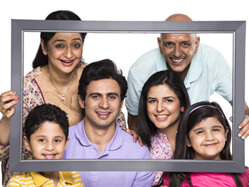ABHA isn't just a technological upgrade. It's a chance to reimagine healthcare—making it more patient-friendly, more accessible, and ultimately, more effective. The real question is: can we afford not to change?
What is the ABHA card?
The Ayushman Bharat Health Account (ABHA) is a cornerstone of India's digital health ecosystem under the Ayushman Bharat Digital Mission (ABDM). It aims to streamline healthcare delivery by enabling individuals to link and access their medical records digitally. The ABHA card represents a unique health identity for every citizen, fostering a seamless and efficient healthcare experience.
Key Features of the ABHA Card
- Cashless Transactions
ABHA facilitates cashless healthcare services at empaneled hospitals, reducing financial burdens during medical emergencies. - Electronic Health Records (EHR)
ABHA integrates EHRs, enabling secure storage, retrieval, and sharing of medical history across healthcare providers. This ensures better clinical decision-making and continuity of care. - Portability
The ABHA card allows beneficiaries to access healthcare services across different locations within India, ensuring convenience and flexibility. - Transparency and Accountability
By digitizing transactions and maintaining detailed records, ABHA enhances transparency in fund utilization and reduces corruption in healthcare delivery. - Real-time Monitoring
The system tracks fund allocation and usage in real-time, ensuring efficiency and minimizing misuse. - User-centric Data Privacy
ABHA employs a consent-driven model for sharing health data. Users can choose which records to share, ensuring privacy and control over personal information. - Unique Health Identifier
Each user receives a 14-digit ABHA number that serves as their digital health identity and an ABHA address to facilitate easy access to healthcare services. - Interoperability
ABHA is designed to work seamlessly with public and private healthcare systems, encouraging widespread adoption across the sector. - Enhanced Accessibility via Mobile Application
The ABHA mobile app enables users to access prescriptions, lab reports, and medical diagnoses securely, anytime and anywhere.
What You Are Missing Out On Choosing Not to Use ABHA
Imagine standing in a hospital, struggling to remember your last medication, hunting through old files for a medical record, or explaining your entire health history to a new doctor. This is the reality for those who choose to ignore the ABHA health card—a decision that could cost you more than just convenience.
By not enrolling in ABHA, you're essentially choosing complexity over simplicity. You're opting to:
Lose Control of Your Health Narrative
Without ABHA, your medical records remain scattered, fragmented, and vulnerable. Each new doctor becomes a detective, piecing together an incomplete puzzle of your health history. ABHA gives you a centralized, secure platform where you control who sees your medical information and when.
Holistic Healthcare Limitations
ABHA opens doors to AYUSH healthcare services, providing access to traditional medicine systems like Ayurveda, Yoga, and Homeopathy. By avoiding ABHA, you're narrowing your healthcare options and missing opportunities for comprehensive, integrated treatment approaches.
Risk Medical Errors
Fragmented medical records increase the chances of critical mistakes. A doctor might miss an important allergy, prescribe conflicting medications, or overlook a crucial aspect of your medical history. ABHA ensures that your complete health story is just a click away, reducing the risk of potentially dangerous medical errors.
Miss Out on Streamlined Healthcare
Think about insurance claims that take weeks, repeated medical tests that drain your wallet, and consultations where you spend more time explaining your history than getting treatment. ABHA eliminates these frustrations, making healthcare faster, more efficient, and more patient-friendly.
Compromise Your Emergency Preparedness
In critical moments, every second counts. ABHA allows you to add a nominee who can access your medical information during emergencies. Without this, your loved ones might struggle to make informed medical decisions when you need help most.
Remain in the Healthcare Dark Ages
While the world moves towards digital, personalized healthcare, not adopting ABHA means staying trapped in an outdated system. You're choosing paperwork over progress, confusion over clarity.
The choice is clear. ABHA isn't just a card – it's your passport to a smarter, safer, and more empowered healthcare experience. The question isn't whether you can afford to join but whether you can afford not to.
Conclusion
The ABHA health card represents more than just a technological upgrade—it's a fundamental transformation of healthcare in India. As we stand at the crossroads of digital innovation and patient empowerment, the choice is clear: embrace a system that puts you in control or remain trapped in the limitations of traditional healthcare.
Every day of hesitation is a missed opportunity to streamline your health management, reduce medical errors, and take charge of your personal health journey. ABHA isn't about replacing human care; it's about enhancing it. It's about creating a healthcare ecosystem that is more transparent, efficient, and responsive to individual needs.
For patients, healthcare providers, and policymakers alike, ABHA offers a glimpse into a future where healthcare is personalized, accessible, and patient-centric. The technology is here. The infrastructure is ready. The only missing piece is you.
FAQs
1. Does ABHA also offer free treatment?
The ABHA card does offer some free treatment plans in specific cases. It can also subsidies your medical costs. Check with your medical provider to know more about if it is applicable in your case.
2. What is the limit of the ABHA card?
The ABHA card has a health insurance limit of up to 5 lakh rupees in both private and government medical establishments.
3. Who is not eligible for the ABHA card?
Any person who is not a citizen of India is not eligible for the ABHA card. This includes foreigners and NRIs, even if they have been visiting India for a long time.





























 An ISO 9001:2015
An ISO 9001:2015 

